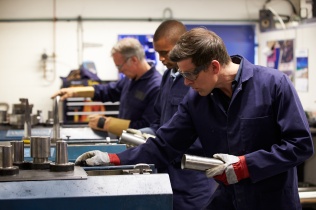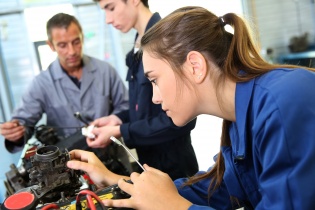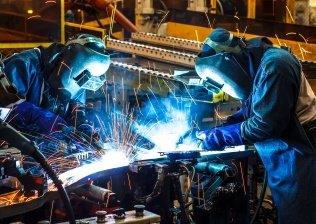Higher and Degree Apprenticeships
Level 4 - Engineering Manufacturing Technician
Overview
The broad purpose of the occupation is to provide specialist technical support for engineers, so that organisations can develop, produce or test new/existing products, processes, or procedures to meet a customer specification in terms of quality, cost and delivery, as efficiently and effectively as possible. Engineering Manufacturing Technicians gather information and data from a range of sources and analyse the information/data. They will make decisions, solve problems and produce and/or update technical documentation, reports or specifications covering areas such as quality, reliability, production schedules/targets, costing or other technical documentation that informs others, either internally or externally what needs to be done such as how a product must be designed, manufactured, tested, modified, maintained, stored, transported, commissioned or decommissioned.
Engineering Manufacturing Technicians can be office based, manufacturing/plant based or more commonly combination of both, working with engineering and/or manufacturing teams at an operational level such as with production team leaders and/or management level working with specialist quality or design engineers. They will typically report to an engineering or manufacturing manager as part of a cross functional team, the size of this team and responsibilities will vary depending on the size of the employer.
Full details of this apprenticeship can be found here
Level 4 - Improvement Practitioner
Overview
The main role of the improvement practitioner is to identify and lead thr delivery of change across organisational functions and processes. Improvement Practitioners use a blend of Lean and Six Sigma, project and change management principles and tools to identify and lead the delivery of change across organisational functions and processes. Improvement Practitioners can be found across all sectors and functions including automotive, banking, engineering, food products, IT, property, retail, and telecoms, Local and County Councils, NHS, Voluntary / Charity, Utilities, Pharmaceuticals, Insurance, Hospitality etc.
Full details of this apprenticeship can be found here
Level 4 - Lead Engineering Maintenance Technician
Overview
The broad purpose of the occupation is to offer engineering support, technical leadership and expertise. Examples can include support for installation, refit, overhaul, alteration, upgrading, design and maintenance. They can also provide support for testing of significant assets, systems or machinery. They assist in the delivery of complex and critical asset management programmes. These asset management programmes are often to unique specifications involving complex maintenance and planning. They analyse technical information, plan schedules, co-ordinate, and lead and deliver work on time. They ensure work is completed to the required quality, following product and personnel safety processes. They provide customer liaison, leadership, support and expertise to maintenance teams on technical issues. They deal with problems that occur using a structured and controlled approach. They carry out inspections on systems, equipment and components. They may lead on the commissioning back into operation after maintenance and overhaul. They can work in office environments while conducting research or maintenance design and scheduling activities. They can be in a workshop environment or outdoors conducting maintenance and commissioning activities. Depending on the organisation, they might be expected to work flexibly, including shift work. They may also be ‘on-call’, to meet customer requirements.
Full details of this apprenticeship can be found here
Level 4 - Process Leader
Overview
Process Leaders are found in organisations with high volume manufacturing or advanced manufacturing processes in which large volumes of products are made in assembly, moulding, metal processing, chemical processing, pharmaceutical, textiles, food and drink, or similar processes. They are also found in organisations with engineering operations or low volume manufacturing processes in which lower volumes of products are made in a bespoke or workshop type environment. The core knowledge, skills and behaviours of this apprenticeship will be developed and demonstrated in a specific manufacturing context and are broadly transferable to other manufacturing sectors.
Full details of this apprenticeship can be found here
Level 6 - Aerospace Engineer
Overview
The following standard reflects employers’ requirements for the skills, knowledge and behaviours required to be competent in the job roles of Aerospace Engineering and Advanced Manufacturing.
Aerospace Engineers will work primarily within a specific Engineering discipline, such as Airframe, Design and Stress, Systems Integration, Support Engineering, Quality or Advanced Manufacturing/Manufacturing Engineering. They will focus on all aspects related to the full lifecycle of systems and products. Aerospace Engineers must comply with statutory regulations and organisational safety requirements. They must be able to use and interpret engineering data and documentation such as engineering drawings, reports and computer generated models. They will be expected to work both individually and as part of an Engineering team, often comprising several disparate Engineering disciplines. They will be expected to design, develop, specify, analyse, test, validate and modify designs and solutions to satisfy Customer requirements and In-Service Operations.
The requirements are designed to offer stretch and progression. They will be able to work with minimum supervision, taking responsibility for the quality, accuracy and timely delivery of the work they undertake. They will be proactive in finding solutions to problems and identifying areas for improving the business.
Full details of this apprenticeship can be found here
Level 6 - Manufacturing Engineer
Overview
Manufacturing Engineers primarily support the activities involved in bringing design programmes into manufacture. This role is pivotal to the launch planning and smooth delivery of exciting new products or product refresh programmes. The focus is on the advanced manufacturing techniques and project management skills required to launch products on time, on cost and to the right quality.
Typically Manufacturing Engineers work closely with a range of other engineers, functions and managers both within their own company and supplier base.
Full details of this apprenticeship can be found here
Want to employ an apprentice with Seta's support? Click here
Want to know whats involved in a High and Degree apprenticeship? Click here to watch our video.
To apply for a Seta apprenticeship, click here






 Website by Horizonworks
Website by Horizonworks